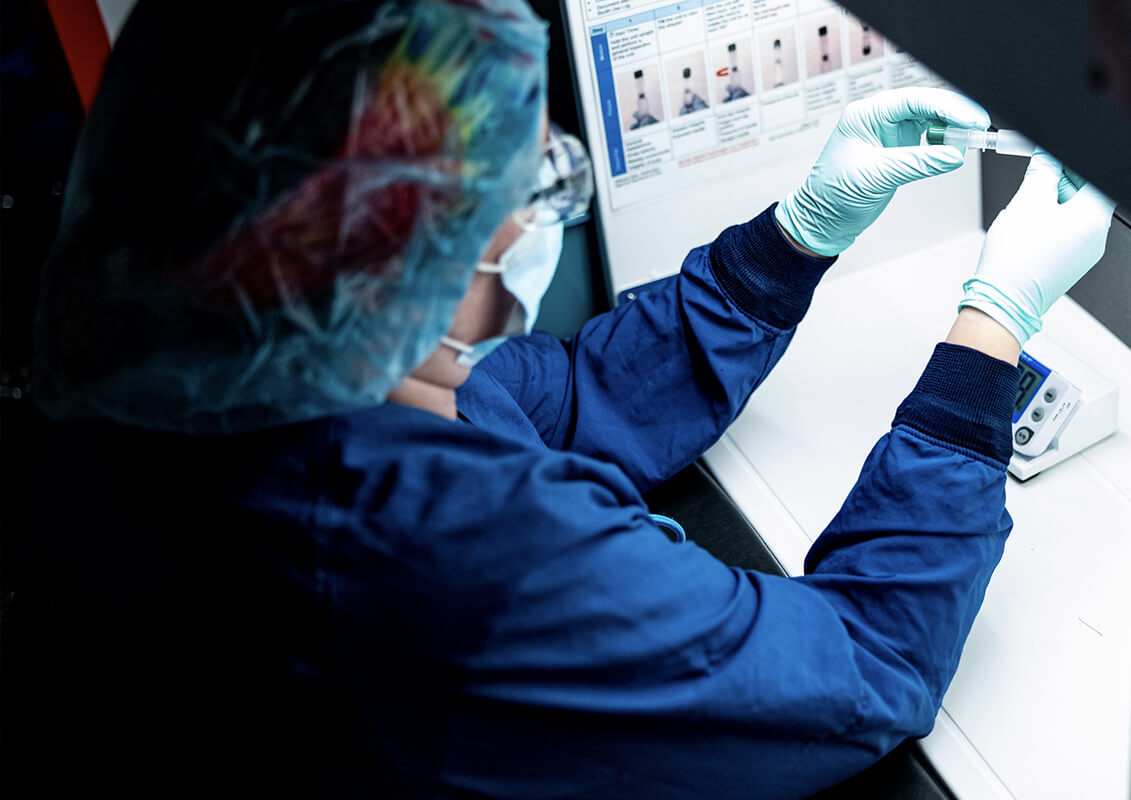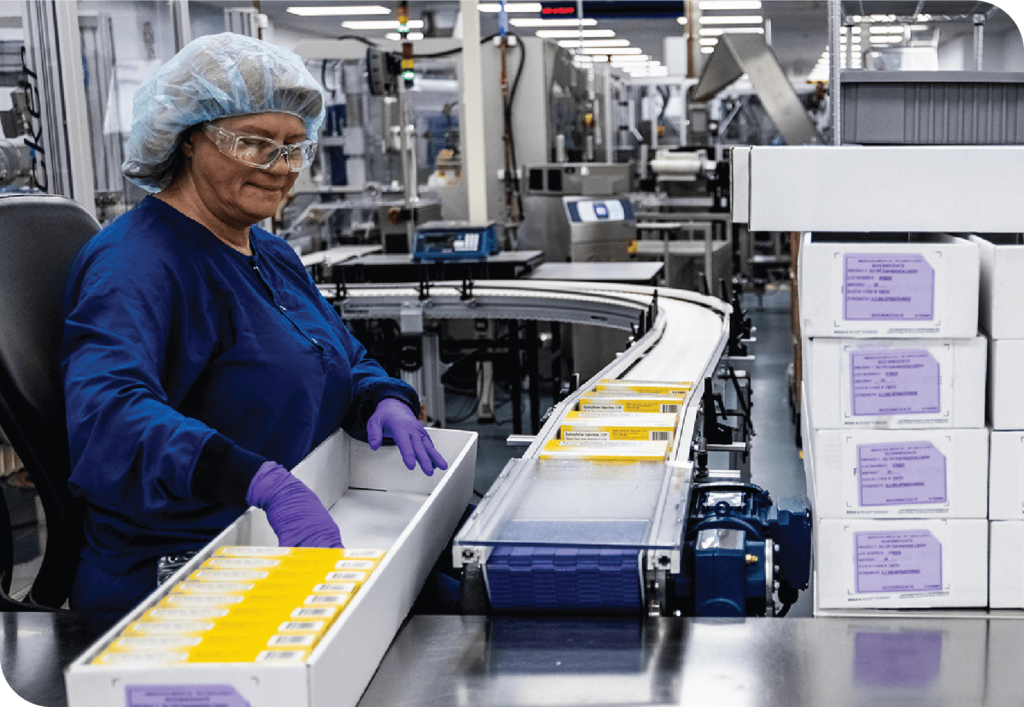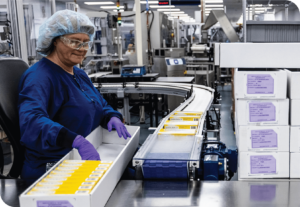At Kindeva Drug Delivery, quality is at the core of everything we do. As a top five global combination product CDMO, we have an ongoing commitment to ensure both quality and compliance are built into every step of the drug-device development process, from ideation through post-commercialization — and we have more than a century of success stories to prove it.
We work within Quality by Design (QbD) principles that align with our right-the-first-time mentality. When you combine forces with Kindeva, you’re choosing industry-leading quality and reliability that bolsters the success of your complex combination product.
Our team of innovators has a solid track record of experience and demonstrated competency with both medical device and pharmaceutical requirements from regulatory bodies all over the world, including full Current Good Manufacturing Practice (cGMP) compliance, CFR 210, CFR 211, CFR 820, 21 CFR Part 4, and ICH Q1A through Q10.

01. Customer
- Alignment to customer expectation
02. Leadership
- cGMP focus
- Quality 1st behaviors
03. People
- Data integrity and right-the-first-time
04. Process
- State-of-the-art processes
- Real-time continuous process
05. Improvement
- Proactive signal management
06. Evidence-based decision making
- Risk based CQV driven
07. Relationship management
- Proactive communication
- Transparency
- Partnership
Quality capabilities
Our targeted quality capabilities include but are not limited to:
From supplier and operations management through to postmarket, Kindeva provides consistent quality throughout the full life cycle of your complex combination product.
Pharmaceutical product serialization
Pharmaceutical product serialization
Overview
Overview and Benefits
In our commitment to delivering the highest standards of safety, traceability, and quality in the pharmaceutical industry, Kindeva employs state-of-the-art product serialization processes. Product serialization, a crucial aspect of our supply chain management, involves assigning unique identifiers to each individual product unit, enabling precise tracking throughout the entire life cycle — from manufacturing to distribution.
What Is Pharmaceutical Product Serialization?
Product serialization is the process of assigning a unique and traceable identifier, typically in the form of a barcode, QR code, or RFID tag, to each unit of a pharmaceutical product. This identifier serves as a digital fingerprint, allowing for precise monitoring and traceability at every stage of the supply chain. By implementing serialization, we ensure that each product can be uniquely identified, authenticated, and tracked, mitigating the risks associated with counterfeiting, diversion, and other threats to the integrity of pharmaceutical products.
Significance in Ensuring Safety and Compliance
At Kindeva, we recognize the paramount importance of product serialization in ensuring the safety of our pharmaceuticals and complying with global regulatory standards. Serialization not only safeguards against counterfeit drugs but also enhances overall supply chain security. By adhering to stringent serialization practices, we demonstrate our commitment to meeting and exceeding the regulatory requirements set forth by health authorities worldwide.
The Value of Serialization and Traceability
Breaches of the pharmaceutical supply chain can have serious public health consequences. The market for counterfeit medicines has expanded in recent years and increased globalization of trade. Counterfeit, medications pose a risk to patients as they are often substandard products that are physically indistinguishable from valid product. These counterfeit drugs may be inactive or incorrect, or contain improper dosages that are less, or more, potent than the legitimate drug.
The risk of medication diversion and theft is an additional supply chain security concern. Drug diversion is the transfer of any legally prescribed drug from the person for whom it was prescribed to any other person for illicit use and includes the trading of drugs not legally available for sale in a given country. When drugs are diverted or stolen, the quality and safety of the product cannot be assured or maintained. These drugs may be intentionally altered or damaged due to improper storage or exposure to contaminants. If reintroduced to the market, these products may be ineffective or may pose a risk of additional health complications for patients.
Traceability systems, which use the serialized data on each package, can authenticate product and/or trace the product’s path through the supply chain. Although serialization requires large investments of time and resources, with the appropriate infrastructure and technology, the data acquired from serialized product can be leveraged to address challenges, such as counterfeiting or diversion, faced by a country.
How Pharmaceutical Product Serialization Works at Kindeva
Our serialization process begins at the manufacturing stage, where each product unit is assigned a unique identifier. This identifier is then encoded into a scannable code, allowing for seamless integration into our digital tracking systems. As products move through the supply chain, each scan captures crucial information, such as packaging code, Serial number, Lot details and expiration date. This comprehensive approach enables us to swiftly trace and verify the authenticity of every product, fostering a secure and transparent supply chain.
Packaging in the pharmaceutical industry has three main headings.
Primary packaging
Primary packaging is the packaging in contact with the drug. The aluminum blister is the most common primary packaging used in the vial and bottle industry. The serialization of the primary packaging is not a requirement in any market other than the American and Indian markets. This is because these are the only markets where, even if it is exceptional, the patient can purchase the primary packaging.
Secondary packaging
This is the packaging that contains the primary packaged medicine or medicines. The best example of this packaging is the carton. On average, 80% of the medicines in the world are sold in a carton. The serialization of this packaging is a must for regulatory compliance. Some regulations, such as EU-FMD, require Tamper Evident, along with pharma serialization, to guarantee that the medicine is first opened by the patient.
Tertiary packaging
You can carry out B2B operations in the supply chain by making medicines into a whole with tertiary packaging. The best examples of tertiary packaging are bundles, cases, and pallets. The serialization of tertiary packaging is the most important point to ensure traceability in the supply chain.
Pharmaceutical Product Serialization
Benefits of Product Serialization
Enhanced patient safety
Serialization minimizes the risk of patients receiving counterfeit or substandard medications, contributing to overall patient safety.
Supply chain visibility
Our serialization practices provide real-time visibility into the movement of pharmaceuticals, enabling proactive management of inventory and distribution.
Regulatory compliance
By implementing serialization, we align with global regulatory standards, ensuring compliance with industry-specific guidelines and requirements.
Combatting counterfeiting
Serialization acts as a powerful deterrent against counterfeit drugs, safeguarding our products and protecting the well-being of patients worldwide.
Key Challenges
The pharmaceutical manufacturing industry must overcome several challenges related to enhancing product visibility throughout the supply chain and combating the spread of counterfeit drugs throughout the market. With Kindeva’s adoption of a unique serialization process, it comes with its own set of challenges.
Keeping abreast with global regulatory changes
Maintaining compliance with the relevant regulations is of utmost importance for companies like Kindeva. Ensuring compliance with the diverse and evolving regulations can pose a significant challenge to pharmaceutical manufacturers to remain operational, especially across various markets.
Integration with existing systems
Integrating the serialization processes with various systems (e.g., manufacturing, packaging, and distribution) can be complex. When it comes to system upgrades and system replacements, several compatibility issues may occur which can result in a significant increase in capital investment and resources.
Data management and security
Pharmaceutical manufacturers need to acquire sophisticated IT infrastructure that will allow them to generate, store, and transmit serialization and other data. Companies need to ensure that the data is well-protected with various security measures. This is critical to prevent unauthorized access, tampering, and/or data breaches.
Enhancing employees’ knowledge base through relevant training
Being able to train relevant personnel on the serialization process, procedures, and best practices is crucial as it provides an avenue for the reduction of errors and various inefficiencies.
Regulatory Compliance
Our Commitment to Global Standards
At Kindeva, we prioritize regulatory compliance as a cornerstone of our commitment to the highest standards of pharmaceutical safety and integrity. Our product serialization practices align with global regulations and industry standards, ensuring that our products not only meet but exceed the expectations set forth by health authorities worldwide.
Importance of Standards
The implementation of a traceability system effectively requires the interoperable exchange of data. Stakeholders must have servers that can communicate with one another, and data must be transferable, without alteration or translation, from trading partner to trading partner. Global standards for data exchange allow products to be seamlessly followed across country borders and allow for global supply chain security. Utilizing data standards creates a common language among different servers, which enables supply chain members to exchange data in a common and understandable format. System efficiencies and cost savings are created when trading partners adhere to standards for data exchange.
Data sharing
A widely utilized standard for sharing event data is the Electronic Product Code Information Services (EPCIS) standard created by GS1. The goal of EPCIS is to enable disparate applications to create and share data between trading partners and internally about each product event (e.g., the initial serialization or “commissioning” of a product, the shipment of a product, and the dispensing of a product). EPCIS can operate within diverse information technology (IT) environments to identify where products are and why they are there.
Understanding the Drug Supply Chain Security Act (DSCSA)
A pivotal regulation shaping the landscape of pharmaceutical serialization is the Drug Supply Chain Security Act (DSCSA), enacted in the United States to enhance the security of the drug supply chain. This legislation mandates a phased implementation of serialization requirements, with the ultimate goal of ensuring the traceability of prescription drugs throughout the supply chain. The Drug Supply Chain Security Act (DSCSA) is a U.S. federal law that was enacted to enhance the security of the pharmaceutical supply chain and protect consumers from exposure to counterfeit, stolen, contaminated or any harmful drugs.
Key Components of the DSCSA
Product serialization
The DSCSA requires pharmaceutical manufacturers to affix a unique product identifier to each package of prescription drugs. This identifier includes a serial number, lot number, and expiration date, facilitating traceability.
Product tracing
The act outlines the need for enhanced product tracing capabilities, enabling stakeholders to trace the distribution history of each product back to its manufacturer.
Verification and notification
The DSCSA establishes requirements for wholesale distributors, dispensers, and third-party logistics providers to verify the legitimacy of the product identifier and respond to verification requests promptly.
Quarantine and investigation
In the event of a suspect or illegitimate product, the DSCSA mandates procedures for quarantine, investigation, and notification to relevant authorities.
How We Ensure Compliance
At Kindeva, compliance with the DSCSA and other global regulations is integral to our operations. Our serialization processes are designed to meet and exceed the requirements set forth by the DSCSA, providing a robust framework for product traceability and security.
We are committed to:
- Accurate serialization
- Implementing accurate and tamper-evident serialization codes on each product package.
- Timely reporting
- Ensuring timely reporting and communication with regulatory authorities, as required by the DSCSA.
- Collaboration with stakeholders
- Collaborating closely with stakeholders across the supply chain to enhance overall compliance and transparency.
Our Global Approach to Compliance
Beyond the DSCSA, we extend our commitment to compliance to encompass a global perspective. Our serialization practices adhere to a range of international regulations and standards, reflecting our dedication to fostering a secure and interconnected pharmaceutical supply chain.
Serialization Process
How to Implement Pharma Serialization
Legislators usually use guidelines from the GS1 organization, which specializes in traceability, when preparing regulations on pharma serialization. Using the definitions in these guides, the structure of the data carrier 2D Datamatrix code which meets the requirements of the pharmaceutical market can be easily built in compliance with local regulations. Serialization for a drug is complete when the built code is printed on the drug packaging.
To implement the simplest pharma serialization, you need the following information:
- GLN and GTIN: You can easily access this information by registering with the local GS1 organization in your country. GLN is your global address where you operate, and GTIN is the unique identifier of your products around the world.
- Serial number: A numeric or alphanumeric character sequence consisting of up to 20 digits, which must be unique for each GTIN.
- Lot information: A company-specific production used during the manufacture of the drug.
- Expiration date: The area indicating the expiration date of the drug.
Global Impact
Securing the Pharmaceutical Supply Chain Worldwide
At Kindeva, we recognize that the impact of our serialization practices extends far beyond our organizational borders. Our commitment to product serialization is a testament to our dedication to global pharmaceutical supply chain security, patient safety, and industry advancement.
Confronting Global Challenges
The pharmaceutical industry faces numerous challenges, with counterfeit drugs and compromised supply chains posing significant threats to public health. Our proactive approach to serialization directly addresses these challenges, contributing to the creation of a safer and more reliable pharmaceutical ecosystem on a global scale.
How Our Serialization Practices Make a Difference
Combatting counterfeit drugs
By implementing robust serialization processes, we actively contribute to the prevention of counterfeit drugs infiltrating the market. Each serialized product carries a unique identifier, making it easier to identify and eliminate counterfeit or substandard medications.
Enhancing patient safety
The global impact of our serialization practices is most evident in the improved safety of patients. Serialization ensures that patients receive genuine and quality pharmaceuticals, safeguarding their health and well-being.
Supporting regulatory harmonization
We support and participate in efforts toward regulatory harmonization. Our serialization practices align not only with regional regulations but also with international standards, fostering a collaborative approach to pharmaceutical supply chain security.
Industry Collaboration for a Safer Future
Recognizing that a secure pharmaceutical supply chain requires industry-wide collaboration, we actively engage with stakeholders, industry organizations, and regulatory bodies. By sharing insights, best practices, and innovative approaches, we contribute to the collective efforts aimed at raising the bar for pharmaceutical safety and traceability globally.
Transparency and Accountability
Our commitment to global impact is rooted in transparency and accountability. Through our serialization practices, we empower regulators, healthcare providers, and patients with the tools they need to trust and verify the authenticity of pharmaceutical products, regardless of geographic location.
Joining Forces for a Safer Tomorrow
At Kindeva, we invite you to join us in our mission to create a safer tomorrow. By prioritizing product serialization and embracing global collaboration, we can collectively build a pharmaceutical industry that prioritizes patient safety, regulatory compliance, and the highest standards of quality.
For inquiries or further information about our global impact initiatives, please contact us.

